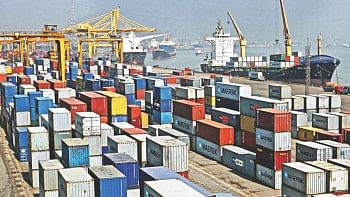Dhaka should ask for compensation, not aid
Bangladesh should not ask for charity or aid from industrially developed countries to combat climate change but demand compensation from them, speakers at a dialogue in the city said yesterday.
The reason for this, they said, is that the industrially developed countries are themselves causing the change in climate.
The comments came at a dialogue arranged by BBC Bangla Sanglap (Dialogue) at the Bangladesh-China Friendship Conference Centre on “Bangladesh Sanglap on Climate Change” yesterday.
Rezaul Karim Chowdhury, convener of Equity-BD and a panel member at the dialogue, said, "We should not be seeking help from developed countries. It is a question of justice and reparation.”
“The developed countries have caused loss to Global Public Goods and they must compensate," he said.
The effects of climate change are causing a huge loss to the government economically, speakers pointed out, citing the example of Sidr. Bangladesh received US$ 600 million in foreign aid though the loss caused by Sidr is estimated at US$ 3 billion. Bangladesh has an existing bank loan of Tk 17,000 crore while natural disasters like cyclone, flood and other climate change effects add to the deficit every year.
Dr Atiq Rahman, chairman of South Asia Climate Action Network, Prof Shahnaz Haque Hossain, dean of environment sciences faculty of Dhaka University, Prof Mominul Haque Sarker and CEGIS Head Morphologist Mominul Haque Sarker were the other panel members of the dialogue, while BBC's Masud Hasan Khan moderated the event.
Dr Atiq Rahman pointed out that "the sea level will rise by at least one metre by 2050 -- with possibilities of rising upto 1.5 metres,” causing unthinkable damage to the world.
“A one metre rise will affect 13% of the agriculture land and 17% of the remaining land of the country as Bangladesh will be among the first countries to be affected by this change," he said.
In that case, Dr Atiq pointed out, the sea will come within 60 to 100 km of the capital city and most of the southern areas of the country will go under water. Other countries like the Maldives would go totally underwater.
Dr Atiq also said that the loss from climate change would be higher than that estimated by the International Panel for Climate Change (IPCC).
The speakers at the dialogue also criticised the paper that is to be presented in the upcoming bilateral talks on climate change in UK, saying the paper was “limited towards effects on infrastructure” and was ' research-centred' and not based on any field level work or information.
The talks are scheduled for September 10.
They stressed the need for the developed and developing countries' making a commitment to address the issue of climate change.
Experts at the dialogue called on the government to formulate a coordinated policy to address the issue. They praised the government for allocation in this year's budget in this regard but pointed out that Bangladesh is not responsible for climate change, and countries causing the problem must take responsibility for their actions.
Funds for adaptation and research to combat the situation should come from the countries causing the damage, they said.
The speakers also urged the industrially developed countries to introduce special quota for Bangladesh to help people migrate from the affected areas in accordance with existing international laws.
Shahnaz Haque said that we must overcome the fear of damage caused by climatic change and take effective steps to combat it.
"Our real concern is whether human activities is harming the natural system," she said.
It was revealed at the dialogue that fifty percent of Kutubdia Island has already gone under water. At the present rate of land erosion, both Kutubdia and Bhola will go completely underwater in another 40 and 70 years.
Mominul Haque said, "What really matters is how much the sea level will rise and for how long?”

 For all latest news, follow The Daily Star's Google News channel.
For all latest news, follow The Daily Star's Google News channel. 



Comments